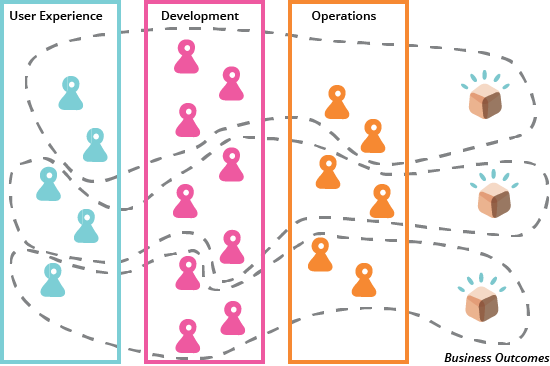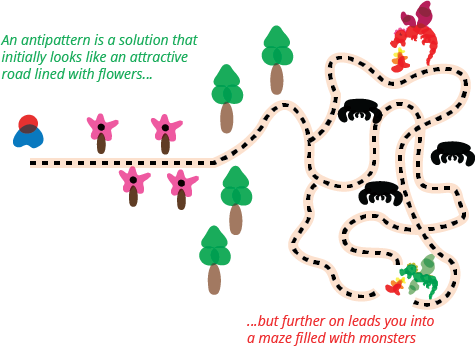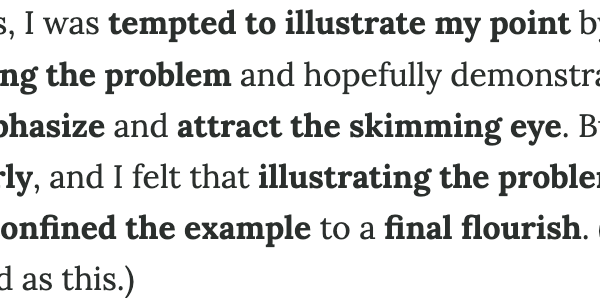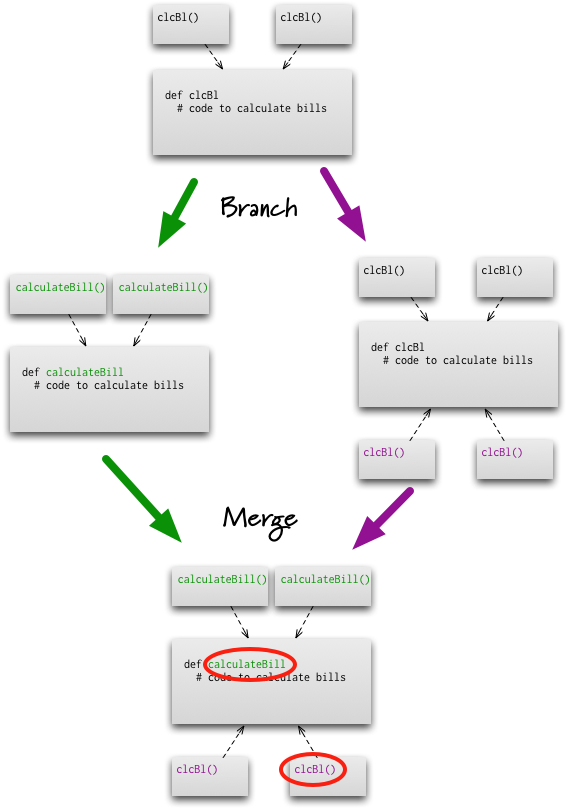tagged by: bad things
Activity Oriented

Any significant software development effort requires several different activities to occur: analysis, user experience design, development, testing, etc. Activity-oriented teams organize around these activities, so that you have dedicated teams for user-experience design, development, testing etc. Activity-orientation promises many benefits, but software development is usually better done with OutcomeOriented teams.
Agentic Email
I've heard a number of reports recently about people setting up LLM agents to work on their email and other communications. The LLM has access to the user's email account, reads all the emails, decides which emails to ignore, drafts some emails for the user to approve, and replies to some emails autonomously. It can also hook into a calendar, confirming, arranging, or denying meetings.
Aliasing Bug

Aliasing occurs when the same memory location is accessed through more than one reference. Often this is a good thing, but frequently it occurs in an unexpected way, which leads to confusing bugs.
Anemic Domain Model
This is one of those anti-patterns that's been around for quite a long time, yet seems to be having a particular spurt at the moment. I was chatting with Eric Evans on this, and we've both noticed they seem to be getting more popular. As great boosters of a proper Domain Model, this is not a good thing.
Anti Pattern

Andrew Koenig first coined the term “antipattern” in an article in JOOP, which is sadly not available on the internet. The essential idea (as I remember it ) was that an antipattern was something that seems like a good idea when you begin, but leads you into trouble. Since then the term has often been used just to indicate any bad idea, but I think the original focus is more useful.
Assertion Free Testing
Here's a story from a friend of a friend. I'm sure it must be true, at least somewhere.
Bimodal IT
Bimodal IT is the flawed notion that software systems should be divided into these two distinct categories for management and control.
- Front Office systems (systems of engagement) should be optimized for rapid feature development. These systems of engagement need to react rapidly to changing customer needs and business opportunities. Defects should be tolerated as the necessary cost for this rapid development cycle.
- Back Office systems (systems of record) should be optimized for reliability. As systems of record, it's important that you don't get defects that damage the enterprise. Consequently you slow down the rate of change.
Call Super
Call Super is a minor smell (or anti-pattern if you like) that crops up from time to time in OO frameworks. Its symptoms are pretty easy to spot. You are inheriting from a super-class in order to plug into some framework. The documentation says something like “to do your own thing, just subclass the process method. However it's important to remember to start your method with a call to the super-class”. An example might be something like this.
Catastrophic Failover
One of the oft advertised features of modern application servers is that they provide failover in a cluster. Clustering improves the reliability of your application, if one of your servers goes down, you have some more up to server your customers. Failover can add even more reliability, if a server goes down in the middle of a interaction the cluster can move that interaction to another server.
However this can be a problem.
Data Clump
Whenever two or three values are gathered together - turn them into a $%#$%^ object.
-- Me (it was funnier with the voices)
This is one of my favorite CodeSmells from the refactoring book. You spot it when you constantly see the same few data items passed around together. start and end are a good example of a data clump wanting to be a range. Often data clumps are primitive values that nobody thinks to turn into an object.
Detestable
(Here's an addition to your dictionary.)
Detestable (adjective): software that isn't testable.
Diversity Imbalance
Although it's easy to become accustomed to it, it's pretty obvious the software development world has some serious issues in diversity. By this I mean that we have some notable differences in proportions of people compared to the general population. One of the most obvious differences is the low proportion of women, which is true all over the world (albeit noticeably less so in China). In the US, where I spend a good chunk of my time, the lack of African-Americans is also obvious. There's a lot been written on why such imbalances might exist, and what might be done about it. But here I want to concentrate on a more fundamental question - does it matter?
Erratic Test Failure
I was working on some of my book example code the other day. I made some changes, got everything working, ran tests, and committed it to my personal repository. I then moved over to a different area and made a couple of changes - and some unexpected tests broke in the previous area. Now part of the point of running automated tests is to find unexpected breaks, but this book code has completely independent areas. This was odd.
Excessive Bold

I'm increasingly seeing a lot of technical and business writing make heavy use of bold font weights, in an attempt to emphasize what the writers think is important. LLMs seem to have picked up and spread this practice widely. But most of this is self-defeating, the more a writer uses typographical emphasis, the less power it has, quickly reaching the point where it loses all its benefits.
Feature Devotion
A common, perhaps dominant, practice of agile methods is to develop a list of features (often called stories) for the software that's being built. These features are tracked with index cards, work queues, burndown charts, backlogs, or whatever your tool of choice is.
Flaccid Scrum
There's a mess I've heard about with quite a few projects recently. It works out like this:
- They want to use an agile process, and pick Scrum
- They adopt the Scrum practices, and maybe even the principles
- After a while progress is slow because the code base is a mess
Flag Argument
A flag argument is a kind of function argument that tells the function to carry out a different operation depending on its value. Let's imagine we want to make booking for a concert. There are two ways to do this: regular and premium . To use a flag argument here we'd end up with a method declaration along these lines:
Hidden Precision
Sometimes when I work with some data, that data is more precise than I expect. One might think that would be a good thing, after all precision is good, so more is better. But hidden precision can lead to some subtle bugs.
Local D T O
If you've been keeping an eye on my fellow ThoughtBloggers you'll know that it seems one of my fowlbots has blown a fuse, the Australian sun obviously frizzles these Swedish models.
Jon's annoyed with Data Transfer Objects, but it's not that DTOs are a bad thing, just like any pattern they are useful in a certain context. Patterns always have two parts: the how and the when. Not just do you need to know how to implement them, you also have to know when to use them and when to leave them alone.
Overloaded Getter Setter
I've been poking around in JavaScript recently and one thing
that's struck me is the habit of using the same function name for a
getter and a setter. So if you want to find out the height of your
banner in jQuery you would use $(“#banner”).height()
and if you want to change the height you would use
$(“#banner”).height(100).
This convention is familiar to me, as it was used by
Smalltalk. You might get a value with banner height
and change it with banner height: 100. Knowing it was
a smalltalk convention is enough to expect me to like it, since I
have an distant but abiding love for that language. But even the
best things have flaws, and I can't hide my dislike for this coding
style.
Package Customization
A common question in IT departments is whether to provide a capability by building custom software or by buying a package. For longer than I've been programming the debate has raged about how to make that choice. My base position on this is founded on the UtilityVsStrategicDichotomy. Boiled down this means that if the business process you are supporting is part of your competitive advantage you should build custom software, if not you should buy a package and adjust your business process to fit the way the package works.
Despite the clear excellence of my opinion, not a lot of companies seem to do this. Often they neglect the dichotomy, which is one problem. But the problem I want to focus on here is the common trap when they buy a package.
Premature Ramp Up
One of the good things about software is that people seem to want it, and want it quickly. It's usual for organizations to ask teams to speed up production of software and from time to time the organization seeks to help in the way that really shows its commitment - by spending money to add more people to the team.
Semantic Conflict

Those who hear my colleagues and I talk about FeatureBranch know that we're not big fans of that pattern. An important part of our objection is the observation that branching is easy, but merging is hard. One argument we hear from time to time is that modern VersionControlTools make merging sufficiently easy that feature branching is worthwhile.
Semantic Diffusion
I have the habit of creating Neologisms to describe the things I see in software development. It's a common habit amongst writers in this field, for software development still lacks much useful jargon. One of the problems with building a jargon is that terms are vulnerable to losing their meaning, in a process of semantic diffusion - to use yet another potential addition to our jargon.
Slideument
A slideument is a cross between a slide deck and a document. The idea is that you can use a single slide deck both for slides during your presentation and as a handout for people to read afterwards. The trouble is that those two needs lead to very different requirements on your slides, so you can't satisfy them both. The result is that slideuments usually fail at both.
Snowflake Server
It can be finicky business to keep a production server running. You have to ensure the operating system and any other dependent software is properly patched to keep it up to date. Hosted applications need to be upgraded regularly. Configuration changes are regularly needed to tweak the environment so that it runs efficiently and communicates properly with other systems. This requires some mix of command-line invocations, jumping between GUI screens, and editing text files.
The result is a unique snowflake - good for a ski resort, bad for a data center.
Story Test
Story tests are BusinessFacingTests used to describe and verify the software delivered as part of a UserStory. When a story is elaborated the team creates several story tests that act as acceptance criteria for the story. The story tests can be combined into a regression suite for the software and provide traceability from the requirements (user stories) to tests and (through execution) to the behavior of the system. Story tests are usually BroadStackTests.
Sunk Cost Driven Architecture
I find this to be a sadly common architectural style. Your company buys some very expensive piece of infrastructure software. You are then told you must use it on a project even if it's not suitable for the project and causes you extra effort. After paying all that money for it you don't want it to go to waste do you?
Test Cancer
As my career has turned into full-time authorship, I often worry about distancing myself from the realities of day-to-day software development. I've seen other well-known figures lose contact with reality, and I fear the same fate. My greatest source of resistance to this is Thoughtworks, which acts as a regular dose of reality to keep my feet on the ground.
Thoughtworks also acts as a source of ideas from the field, and I enjoy writing about useful things that my colleagues have discovered and developed. Usually these are helpful ideas, that I hope that some of my readers will be able to use. My topic today isn't such a pleasant topic. It's a problem and one that we don't have an answer for.
Waterfall Process

In the software world, “waterfall” is commonly used to describe a style of software process, one that contrasts with the ideas of iterative, or agile styles. Like many well-known terms in software it's meaning is ill-defined and origins are obscure - but I find its essential theme is breaking down a large effort into phases based on activity.
